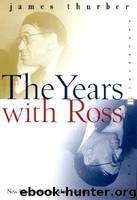The years with Ross by James Thurber

Author:James Thurber
Language: eng
Format: mobi
Tags: New Yorker (New York, 1892-1951, Harold Wallace, N.Y. : 1925), Ross
Publisher: Boston, Little, Brown
Published: 1959-09-22T23:00:00+00:00
/fL^sM^
the regular channels — that is, it had not Ix-cn clcarccl and approved in conference, etc. lie hroodcd about this lor days. It meant that the military system had been flouted and that something was wrong somehow.
"Toward the end of my captivity, Ik Shuman came in one day, having been parted from Paul Block. I assigned him to a Reporter idea on an old motorman or something of the sort. Ik went out and got the story that afternoon and evening and wrote it the next morning. It required virtually no rewriting, or even editing, and Ross was so pleased with it that he gave Shuman a job. But, after some time, Ross began to worry about the story of the old motorman. How long had Shuman worked on it? Shuman told him the truth, and Ross was shocked and hurt. He thought such a story should have required at least a week's work and painful lucubration. Then, following this confusing line of thought, he wondered if he were not being cheated by the waiters who took too much time. This way, of course, lies madness."
Ik Shuman, who held out for eight rough years, was placed, for a time, on Ross's highest pedestal. Ik had helped him work out "a philosophy on payment to contributors." Ik told me in a letter, "The more we spent on the magazine, the longer we held contributors, the greater grew the circulation and the higher grew the advertising rate. We raised every contributor, feeling out our way, and I once figured that for every dollar we spent then, we got back three dollars in revenue." This, to Ross, was one of the miracles of money, one of the wonders of free enterprise. I used to hear him bawling over the phone in his office, "I'll bring Shuman. I want you to meet him. He's finally making some sense out of this place."
Ik's greatest achievement, in Ross's admiring eyes, was a deal he made, in September 1936, with Reader's Digest, which had been paying only eighteen hundred dollars a year for the right to reprint Talk items. Ik not only got fifteen thousand dollars, retroactively, for what the Digest had run in previous years, but he got DeWitt Wallace to agree to pay twenty-five thousand dollars a year in the future. The Digest connection soon became one of Ross's major headaches, and he finally decided to break off the relationship and to refuse to let the other magazine reprint any New Yorker material whatever. "The Digest is a competitor of ours," Ross decided, "and I'll be damned if we're not helping them be just that." He called a conference, the only one in his life, of a group of writers to discuss the situation. They included Sally Benson, Robert Coates, S. J. Perelman, and me, and perhaps a few others. What really had him down, he said, was the Digest's offer to pay New Yorker writers directly — that is, to relieve Ross's weekly of the financial burden of compensating for such pieces as the Digest wanted to condense and reprint.
Download
This site does not store any files on its server. We only index and link to content provided by other sites. Please contact the content providers to delete copyright contents if any and email us, we'll remove relevant links or contents immediately.
Hit Refresh by Satya Nadella(9132)
When Breath Becomes Air by Paul Kalanithi(8442)
The Girl Without a Voice by Casey Watson(7888)
A Court of Wings and Ruin by Sarah J. Maas(7845)
Do No Harm Stories of Life, Death and Brain Surgery by Henry Marsh(6941)
Shoe Dog by Phil Knight(5267)
The Rules Do Not Apply by Ariel Levy(4969)
A Higher Loyalty: Truth, Lies, and Leadership by James Comey(4962)
Hunger by Roxane Gay(4927)
Tuesdays with Morrie by Mitch Albom(4784)
Everything Happens for a Reason by Kate Bowler(4742)
The Immortal Life of Henrietta Lacks by Rebecca Skloot(4587)
Millionaire: The Philanderer, Gambler, and Duelist Who Invented Modern Finance by Janet Gleeson(4478)
How to Change Your Mind by Michael Pollan(4356)
All Creatures Great and Small by James Herriot(4320)
The Money Culture by Michael Lewis(4207)
Man and His Symbols by Carl Gustav Jung(4135)
Elon Musk by Ashlee Vance(4127)
Tokyo Vice: An American Reporter on the Police Beat in Japan by Jake Adelstein(3996)
